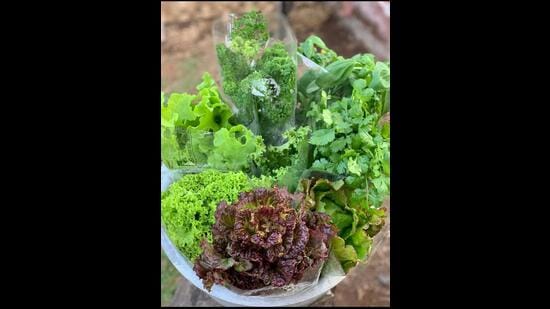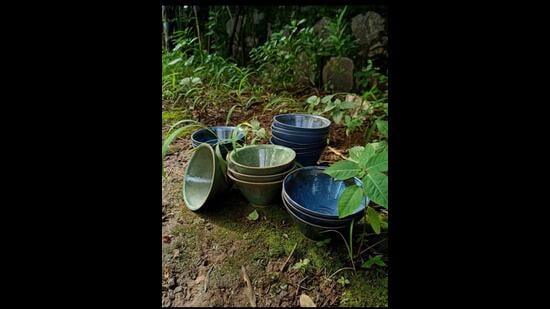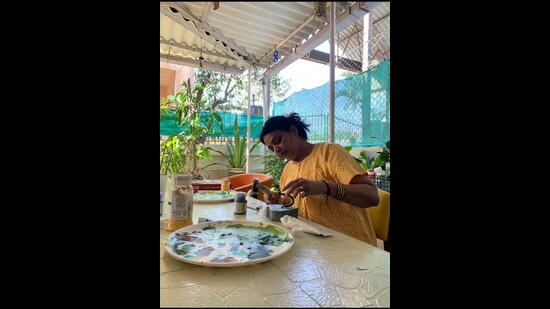When potters Rohit Kulkarni and Bhairavi Naik of Curators of Clay came up with signature glazes inspired by the monsoon, they saw two shades. For Pune-raised Kulkarni whose childhood was filled with treks to Malavli and Bhaja near Lonavala, the monsoon is a mottled colour of different shades of green in one go. Like the Sahyadris during the season. For Mumbai-raised Naik, it is a shade of blue, inspired by the sea of tarpaulins that covers homes in the shanties and Antilia alike. So now they have two glazes—monsoon blue and Sahyadri green, inspired by Lonavala and the ghats.
“That is the magic of these hills. They can have a lasting impression on you. Before the expressway rendered Lonavala and Khandala as extended suburbs of Mumbai, they were truly hill stations with trekking spots, picturesque points and vada pav pitstops,” says Kulkarni, whose mother Nayan and her friend Mary D’souza run a school—Aditi Learning Centre in Kamshet, near Lonavala—for girls who drop out, to encourage them to finish their education.
D’souza’s daughter, Hritodaya Maria, a potter trained at Golden Bridge Pottery is setting up a pottery studio where workshops will be conducted on request.
While during the lockdown, Alibaug, with its flashy yachts and promising RoRo, took off as a preferred luxe destination for weekend getaways and extended stays, good ol’ Lonavala took a backseat. In the process, it has slowly transformed into a niche destination that has much to offer in terms of food, art and craft, design and architecture, wellness and adventure—all spurred by local entrepreneurs and businesses thriving in the hills.
Former journalist Anjali Sethi who moved to Lonavala 15 years ago thinks the growth has been sporadic over the years and that the lockdown only boosted it. Her husband, Amol, is a hotelier by profession and along with his friends Allan Almeida and Dr Tejas Kulkarni, he has founded Offroad Junkie which organises and promotes offroading for all 4×4 makes in India. The three will ditch their busy schedule any day to be off the road.

For the Sethis, a good find during the lockdown has been Franki’s Pizzeria, a homestyle, family-run pizzeria started by a father-daughter duo in Khandala that makes authentic wood-fired pizza. They do not use preservatives or additives. The food is made with fresh ingredients and locally sourced produce.
Creative tunes
While developing into a resort town, Lonavala has built itself into place where creative minds meet. Musician duo Nirali Kartik and Kartik Shah, founders of MaatiBaani, moved there during the lockdown and now call it their second home. They even shot a music video here during their time. “Lonavala is a paradise for those in the creative space, especially music. There is something about the air here that puts your mind at ease. We are building a studio space, an amphitheatre that can accommodate 60 people, and a space where artists can stay and create their music. This project is being designed by the Mumbai-based architectural firm Muse Lab,” says Kartik.

Hyper. Local
For Mumbai resident Manasvi Bhatia, having a holiday home in the hills, surrounded by nature, greenery and space, allows a healthier and more carefree life. “Covid wasn’t as bad in the hills as it was in the city. Despite having a holiday home for almost 30 years now this is the first time I stayed here for a year straight. I didn’t go to Mumbai even once until mid-April 2021,” remembers Bhatia.
In her initial months there, she started exploring the area, made connections residents and started a platform called Lonavala Local. “I thought it would be lovely to have a community in the hills where we can connect with creative like-minded people doing some fabulous work From landscapists to home chefs, bakers, historians and musicians, the community only started getting bigger and better. The platform is a great space to connect, collaborate and co-create and reach out to an audience that is looking to avail services, products or experiences,” explains Bhatia who found it challenging initially to get the people of Lonavala together and to make them believe in their potential.
“On the other hand, it has been heartwarming to see them willing to come out of their comfort zone and opening their homes and hearts to people from different walks of life to experience what they have to offer. Lonavala Local bridges that gap,” she adds. Carefully curated and designed by Bhatia, from jamming sessions to a handmade paper-making workshop to a walkthrough of an artist and historian’s house to visiting a ceramicware artist’s home studio, to going on treks at not-so-popular spots, to board games nights to food trail walks, architectural walkthroughs, baithaks, pop ups and flea markets with local homegrown businesses— it’s an overwhelming experience to see the community come together.

Architect Viraj Kapadia, an avid traveller and fitness enthusiast, connected Bhatia to most of the people residing in the hills, including NGOs that do some wonderful work. He also showed her around hidden gems in the hills for trekkers. “It’s been a delight to see the hills through a different pair of eyes,” says Bhatia. “Also since the hills primarily thrive on tourism, it would be an absolute delight for tourists and travellers to support and encourage local talent homegrown businesses and entrepreneurs.”
Through Lonavala Local, you can meet an Indian artist couple who moved here from Kenya, built an art school and later settled here, decorating their home with tons of art collected over the years from young, aspiring artists. Their art is also on display. A local who learnt pottery from Germany, moved to Pune to set up her studio and is back to the hills converting a part of her house into a studio for display and selling of her ceramic ware. You could even ask for a walkthrough at the National Association for Blind Lonavala centre which empowers senior blind citizens by educating them with different craft skills and letting them showcase their handmade products such as baskets, bags, soaps, hand towels for sale.

Growing for the future
Further ahead in Kamshet, Astrid Rao, who co-founded Native Place, an ecologically designed guesthouse and garden, and Nirvana Adventures, India’s premier paragliding school, tells us about the permaculture courses she conducts there. It is one of the few places where you can relish home-style meals cooked with organic ingredients from the garden and enjoy fresh seasonal produce, such as jams, pickles, vinegar, home-grown spices, herbs, teas, and more.
In 2016, Rao attended a Permaculture Design Course with Narsanna Koppula, the permaculture pioneer of India. It gave her a strong foundation as well as access to a community of like-minded people. She took to seed saving, soil reconditioning techniques, composting, rainwater harvesting and conserving soil, and began to transform every tiny space available into raised beds and boxes for growing food. With this, the early dream of being sustainable took on a new focus—enriching the soil and growing food to supply the guest house.
“I have had an affinity with trees for as long as I can remember, and my prized trophies are the numerous native trees that live in the Native Place Garden. Many medicinal and flowering shrubs are housed here attracting more than 40 species of birds who visit and call our garden home,” she says.

Lonavala local recommends…
1. Poha served with mint chutney, prepared by Sai Khillare
2. Maushi’s vada pav near Bushi dam
3. Manshakti—a Maharashtrian foodie’s delight, cooked by women from the neighbourhood.
4. An organic juice and sandwich bistro cafe tucked in the campus of Kaivalydham institute. They also have a wellness centre housing organic and Ayurvedic products.
From HT Brunch, January 21, 2023
Follow us on twitter.com/HTBrunch
Connect with us on facebook.com/hindustantimesbrunch

